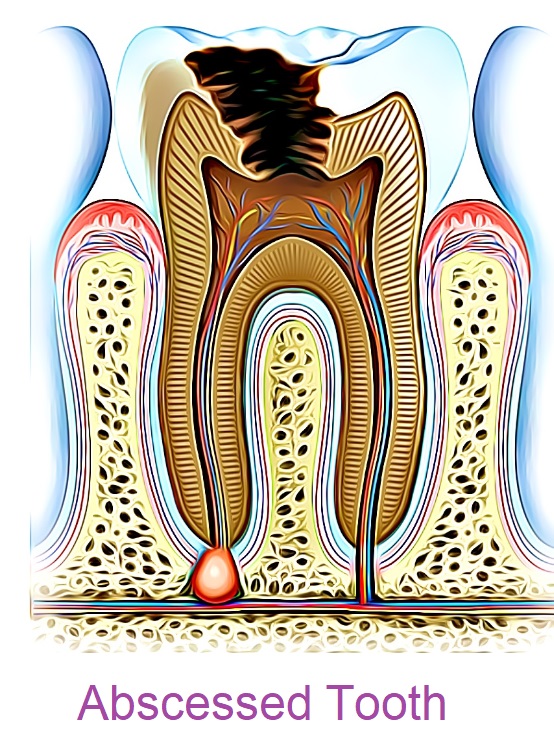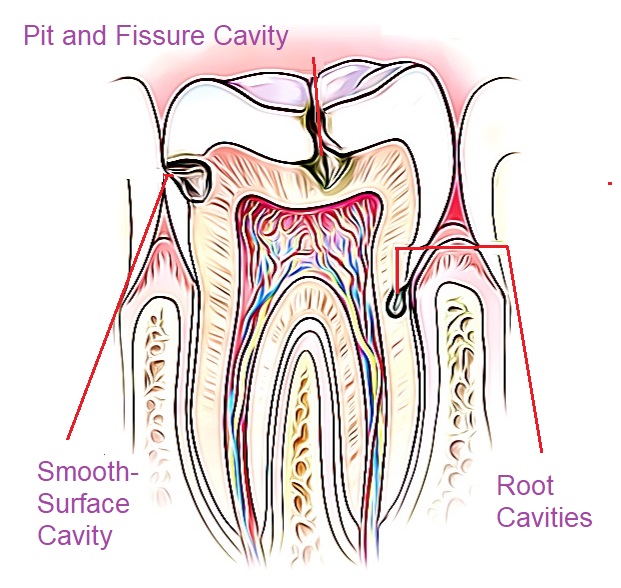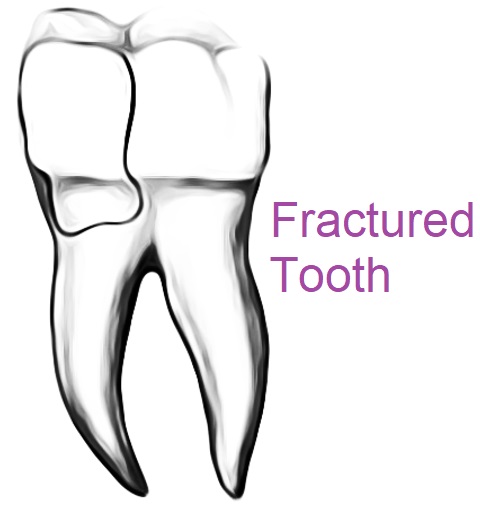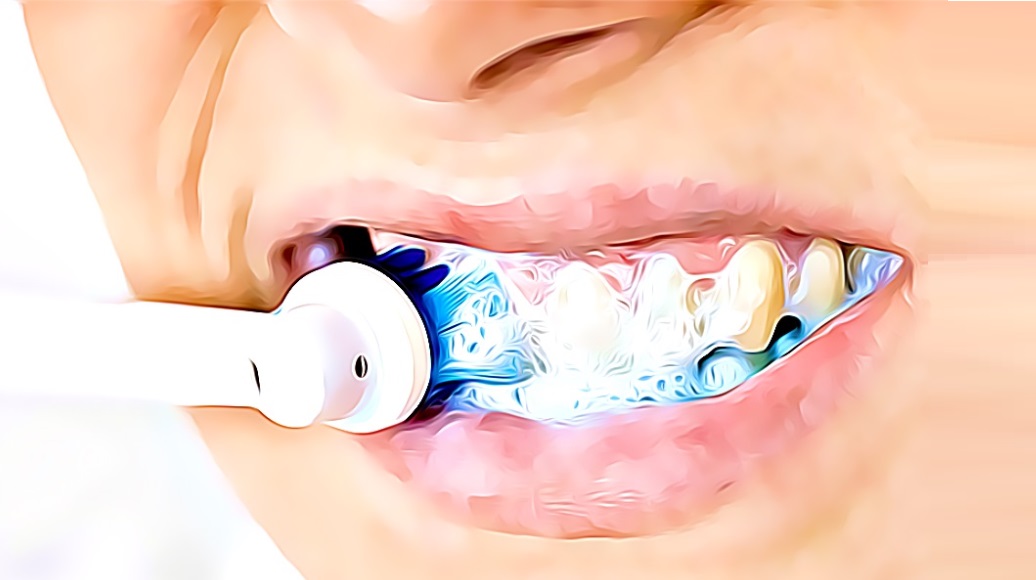
A toothache is a pain inside your tooth, or around your teeth, that is most-commonly caused by one of six different factors listed below. These top six toothache determinants are presented here alphabetically and they are all treatable conditions. Some are easily treatable while other more unfortunate circumstances are more difficult to remedy. Regardless, nobody in Canada (or anywhere on Planet Earth) should ever have to endure the mind-numbing pain of a persistent toothache.
 Abscess: Describes a toothache caused by an abscessed tooth.
Abscess: Describes a toothache caused by an abscessed tooth.
One common cause of a painful toothache is an abscessed tooth. An abscess is an infection inside the tooth or in the gums around the root of the tooth which by itself may or may not be painful. The agony only occurs when the soft tissue inside the root canal dies and or becomes inflamed. This nerve sends pain signals because it’s doing its job warning the human brain that there is an infection occurring in the dental pulp. Sadly however by then it’s probably already too late. It’s certainly past the point of preventing pain. The nightmare scenario most commonly occurs when a dental cavity caused by tooth decay goes untreated for long periods of time, and the decay penetrates deep inside the tooth. The infection can also occur from a broken or cracked tooth – more on that below.
Cracked fillings? How can silver amalgam fillings cause toothaches?
Damaged fillings and (or silver amalgam fillings) can be a real pain. People who work outside in the winter months can regularly expose their teeth, and any silver fillings in their mouths to rapid temperature changes. Hot drinks expand metal fillings and the cold air outside shrinks them; overtime this expansion and contraction can lead to the breakdown of metal fillings and aching teeth. This is another reason Archer Dental only uses composite resin for ‘tooth-colored fillings’ as this dental solution is not affected by temperature changes and does not pose a risk of expanding and contracting. People with silver fillings should be aware and may find comfort avoiding sudden temperature shifts inside their mouths. They may choose to avoid mixing hot food and cold drinks which can also cause metal fillings to expand and contract. With repeated exposure to temperature fluctuations and regular expansions and contractions, silver dental fillings may become loose or the teeth may crack.
 Tooth decay makes teeth ache in pain when the dental pulp inside becomes infected.
Tooth decay makes teeth ache in pain when the dental pulp inside becomes infected.
Tooth decay is widely recognized as the number one cause of toothaches in most modern health journals. The word ‘decay’ is short for decomposition which is a chemistry term to describe the molecular breakdown of tooth enamel. This blog has previously discussed How Everyday Acids & Bases Affect Oral Health & Human Homeostasis, especially at night when we sleep. The damage occurs when the chemical structure of the tooth is weakened by volatile acids that are created when plaque bacteria break down sugar from leftover food in your mouth. If this loss of mineral is left untreated, a cavity, or hole in the tooth, can eventually occur. The toothache happens many days or months later when the pulp becomes infected as described above.
Tooth fractures can cause toothaches long after the tooth-cracking incident occurred.
Cracked teeth or tooth fractures usually occur for many reasons independent of oral hygiene. The best kept smiles in the world are still subject to the slings and arrows of outrageous fortune. Hard blows to the mouth, such as might happen in a car accident, sporting injury, or a slip and fall on the ice are common ways to crack teeth. Read about how Archer Dental provided a Sports Guard to a local Toronto Wrestler in October 2017. Equally hard-to-prevent scenarios that are also prevalent causes of fractured teeth are ill-timed and unfortunate ‘biting forces’. Biting and chewing food puts real pressure on the teeth and dental restorations. Over time, these forces can cause metal or composite resin’s tooth-colored fillings to crack. Eating hard foods or chewing soft food with hidden hazards (cherry pies with loose pits in the filling!), eating hard candy or crunchy foods, opening bottles or ravishing ballpoint pen caps also puts pressure on the teeth. Over time, such dental fillings, and even the teeth, may become fractured and damaged.
Frequent teeth grinding and teeth clenching can also stress otherwise healthy teeth. Such behaviour greatly increases the risk of dental fractures and dental filling damage. The tooth depicted in the sketch on the right shows a ‘fractured cusp’ which is a break in the chewing surface of the tooth. The weakened portion may break off by itself or it may have to be removed by the dentist. Either way it cannot stay there and will likely cause toothaches as long as it remains in this condition. When this happens, the pain will usually be relieved when the injured portion is removed. A fractured cusp rarely damages the pulp, so root canal treatment is seldom needed. Your tooth will usually be restored with a full crown by your dentist.
A split tooth is usually what happens when a cracked tooth is left untreated. The split tooth is identified by a crack with distinct segments that can be separated. Seldom can a split tooth be saved. The position and extent of the crack will determine what’s possible and the operation will test the skill of the surgeon. In rare instances, endodontic treatment and a crown or other restorations are used here at Archer Dental in combination with surgery to save a portion of the tooth.
TMJ Tooth pain is sometimes a phantom pain caused by TMJ disorder.
TMJ tooth pain is a symptom of TMJ syndrome, a group of disorders originating either from the temporomandibular joint or inflammation and pain caused by excessive pressure on the muscles responsible for the movement of the jaw, usually referred to as myofascial pain. Repetitive motions, such as chewing gum or grinding teeth can cause TMJ. The teeth where the TMJ tooth pain is felt can be completely healthy, but many times the pain is so convincing that the patient can point to a specific tooth that is causing trouble. In the day before X-rays and oral scanners, this could sometimes lead to misdiagnosis and unnecessary dental treatments. Today the world is much more aware of the condition and better equipped to treat the pain, phantom or otherwise.
 Your tooth ache is probably the result of your own poor oral hygiene.
Your tooth ache is probably the result of your own poor oral hygiene.
Sorry to be the one to break it to you but statistically it’s quite likely you only have yourself to blame. Here at Archer Dental we never get tired of reminding our patients that by actively maintaining their oral hygiene they are decreasing their risk of oral health problems, including tooth decay and gum disease. Poor oral hygiene is the number one cause of tooth decay and that’s the leading cause of toothaches. Bacteria growing inside your mouth can contribute to gum disease which can be painful and a sign of a more serious condition such as advanced periodontal disease, otherwise known as periodontitis. Periodontitis affects the area of your mouth just below the gum line, in the v-shaped crevice between your tooth and gums, known as the sulcus. This impacts the attachment of your tooth and causes the nearby tissue to break down. Once the tissue is damaged, the sulcus develops into a pocket that can store bacteria and lead to gum infection. Since gums provide fundamental support for our teeth, it’s vital to keep them, and your gum line, in good health. You can read more about Periodontics on Archer Dental’s Oral Surgery service page.
How Can Patients Prevent Toothaches?
Since most toothaches are the result of tooth decay, it stands to reason that by following good oral hygiene practices healthy people can prevent toothaches. Good oral hygiene practices consist of brushing regularly with a fluoride-containing toothpaste, flossing daily, rinsing once or twice a day with an antiseptic mouthwash, and by visiting any of Archer Dental’s three locations in downtown Toronto at least twice a year for professional cleaning. In addition to these healthy practices, eat foods that are low in sugar and rinse your mouth after eating cake or drinking soda.
Common Toothache Remedies
Saltwater Rinse
Cold Compress
Cloves and Castor Oil
Garlic




